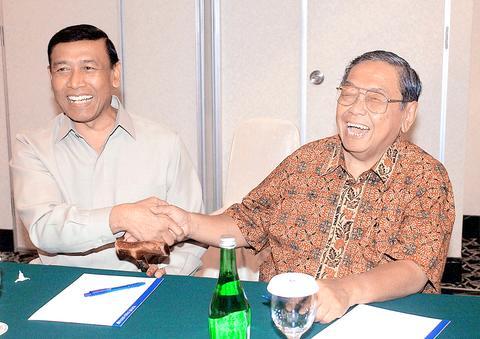Indonesia's ruling party is struggling to formulate a campaign strategy for July's presidential election as it faces the prospect of a poor showing in this past weeks' parliamentary polls, party officials said yesterday.
With 53 percent of the estimated 124 million votes counted yesterday, President Megawati Sukarnoputri's Indonesian Democratic Party of Struggle, or PDIP, had 20.57 percent while Golkar, the party of former dictator Suharto, received 20.17 percent.

PHOTO: AP
Megawati's party was expected to lose about a third of the support it won in the 1999 elections, held a year after Suharto was ousted.
"We need to sharpen our strategy. We are working on who and how Megawati can pair and campaign with in the presidential elections," said a senior PDIP official, Jacob Tobing. "The key is the right coalition. This is crucial."
One possibility being considered was an alliance between the two main rivals.
Subagio Anom, another PDIP official, said Megawati's might be incompatible with Golkar Chairman Akbar Tandjung, but might accept another Golkar leader as her vice presidential running mate.
However, Media Indonesia, a leading national daily, warned in an editorial yesterday that "to pair some of the candidates is like putting a lion and a tiger together in one cage," underlining that personality clashes and not political ideologies may block a coalition.
Meanwhile, Megawati's rivals -- including the predecessor she ousted, Abdurrahman Wahid, and ex-military commander General Wiranto -- were meeting to discuss ways to unseat her in the July 5 presidential elections. They were scheduled to issue a statement later yesterday.
In the July poll, Indonesians will get to chose their president and vice president directly for the first time. In the past, Indonesia's highest legislative body chose the nations' top leaders.
Critics said Indonesians abandoned Megawati's party because they were disappointed with her aloof leadership style, her inability to bring down unemployment and crack down on rampant graft.
Golkar is projected to finish four percentage points ahead of Megawati in the final tally, the Washington-based National Democratic Institute said, based on nationwide vote sampling. Golkar has traditionally reaped a larger share of votes from its regional strongholds, and those results have yet to be counted.
A final tally of Monday's parliamentary ballots could be delayed as 17 of the 24 parties contesting are demanding a recount after complaining that their representatives were not allowed to witness the counting of the votes.

‘DENIAL DEFENSE’: The US would increase its military presence with uncrewed ships, and submarines, while boosting defense in the Indo-Pacific, a Pete Hegseth memo said The US is reorienting its military strategy to focus primarily on deterring a potential Chinese invasion of Taiwan, a memo signed by US Secretary of Defense Pete Hegseth showed. The memo also called on Taiwan to increase its defense spending. The document, known as the “Interim National Defense Strategic Guidance,” was distributed this month and detailed the national defense plans of US President Donald Trump’s administration, an article in the Washington Post said on Saturday. It outlines how the US can prepare for a potential war with China and defend itself from threats in the “near abroad,” including Greenland and the Panama

A wild live dugong was found in Taiwan for the first time in 88 years, after it was accidentally caught by a fisher’s net on Tuesday in Yilan County’s Fenniaolin (粉鳥林). This is the first sighting of the species in Taiwan since 1937, having already been considered “extinct” in the country and considered as “vulnerable” by the International Union for Conservation of Nature. A fisher surnamed Chen (陳) went to Fenniaolin to collect the fish in his netting, but instead caught a 3m long, 500kg dugong. The fisher released the animal back into the wild, not realizing it was an endangered species at

The High Prosecutors’ Office yesterday withdrew an appeal against the acquittal of a former bank manager 22 years after his death, marking Taiwan’s first instance of prosecutors rendering posthumous justice to a wrongfully convicted defendant. Chu Ching-en (諸慶恩) — formerly a manager at the Taipei branch of BNP Paribas — was in 1999 accused by Weng Mao-chung (翁茂鍾), then-president of Chia Her Industrial Co, of forging a request for a fixed deposit of US$10 million by I-Hwa Industrial Co, a subsidiary of Chia Her, which was used as collateral. Chu was ruled not guilty in the first trial, but was found guilty

DEADLOCK: As the commission is unable to forum a quorum to review license renewal applications, the channel operators are not at fault and can air past their license date The National Communications Commission (NCC) yesterday said that the Public Television Service (PTS) and 36 other television and radio broadcasters could continue airing, despite the commission’s inability to meet a quorum to review their license renewal applications. The licenses of PTS and the other channels are set to expire between this month and June. The National Communications Commission Organization Act (國家通訊傳播委員會組織法) stipulates that the commission must meet the mandated quorum of four to hold a valid meeting. The seven-member commission currently has only three commissioners. “We have informed the channel operators of the progress we have made in reviewing their license renewal applications, and